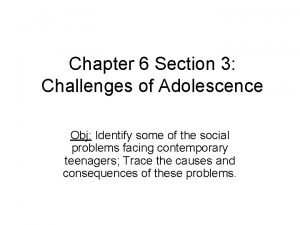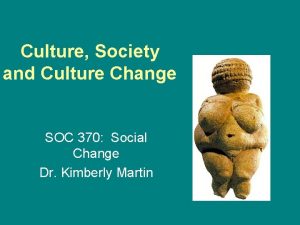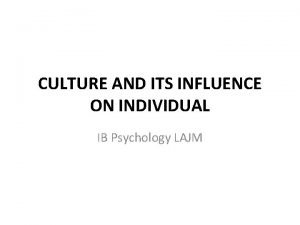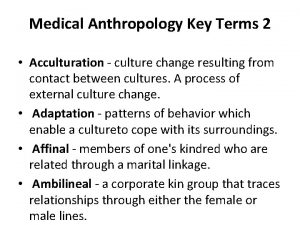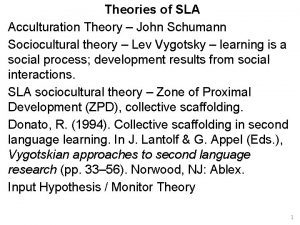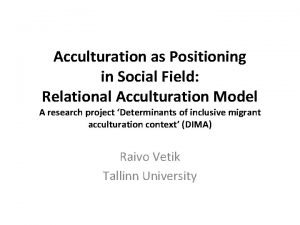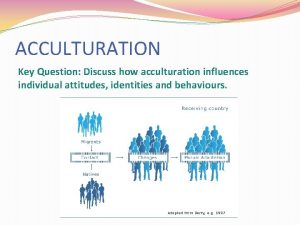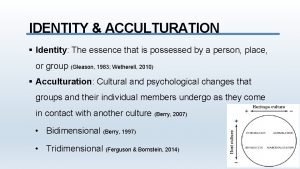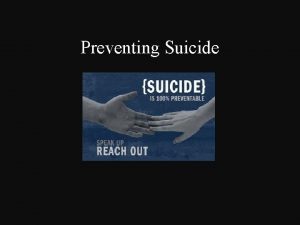Suicide Identity and Acculturation Study of a Social














- Slides: 14

Suicide, Identity, and Acculturation: Study of a Social Problem Within the Hmong Community Presented at the UCI Undergraduate Research Symposium By Machiline Xiong May 15, 2004

Hmong Culture • Children Traditional Gender Roles Withhold Emotions Academic Success • Family Structure Husband Ultimate Authority Large, Extended Families

Hmong Culture (cont. ) • Respect the Elders • Collectivism vs Individualism • Hesitancy to use Western Resources Reliance on Elders Spiritual Healers

Source: Sacramento Bee

What is a Social Problem? • A condition or issue that threatens the quality of life and the most cherished values of most people in a society, leading them to recognize and agree that something should be done to remedy that condition. (Kornblum & Julian, 2001, p. 4) Unless a problem is perceived or recognized as potentially harmful, there will not be a response or attempts to find a solution.

Overview of the Study • 15 participants from San Diego and Fresno Counties • Semi-structured interviews conducted Gender 9 males 6 females Ethnicity • 27% Non-Hmong • 73% Hmong Occupation • 5 Students • 2 Media Sources • 3 Business Professionals • 2 School Counselors • 3 Clinical Health Professionals Table 1

May 2001 8 th Suicide 2001 Aug. 2001 Southeast Asian Meeting Nov. 2001 Suicide Prevention Program Aug. 2002 Media Headlines 2002 Refugee Information Exchange Conference July 2003 Assembly Bill 78 2003 March 2003 HND Conference Washington, D. C.


Main Research Questions • How did the string of teen suicides affect the acculturation of the Hmong? The suicides were used by community leaders as a means to accelerate the acculturation of the Hmong. • “Prior to us, other resources have been looked at as the enemy, but when we go with them and explain to the Hmong families what we’re doing and how we can help them to prevent future conflicts, they’re pretty receptive and they understand. ” - Clinical Health Professional

Main Research Questions (cont. ) • How might the acculturation status of the Hmong be correlated with the suicides? Children are raised to put the interest of others first so they often carry the burden alone • “I usually don’t talk to anyone when I’m having problems…I might tell a friend at school, but I don’t go into detail. …That’s just how I deal with it. ” - Student

Conclusions • Immigrant community leaders can use traumatic events to facilitate acculturation • Suicides used to present to larger audience that the Hmong had a social problem

In Summary… • “The process of becoming an American is most simply called "Americanization, " which must always be a two-way street. All Americans, not just immigrants, should understand the importance of our shared civic culture to our national community. ” (U. S. Commission on Immigrant Reform Report 1997)

Acknowledgements • Dr. Paul Jesilow • Dr. Valerie Jenness • Funding: UCI Undergraduate Research Opportunities Program • Participants from San Diego and Fresno Counties

For more information, please contact: Machiline Xiong Department of Psychology & Social Behavior University of California, Irvine xiongm@uci. edu
 Social integration by emile durkheim
Social integration by emile durkheim Acculturation enculturation
Acculturation enculturation Acculturation model and accommodation theory of sla
Acculturation model and accommodation theory of sla What is nativization model
What is nativization model Enculturation vs acculturation
Enculturation vs acculturation Fla vs sla
Fla vs sla Pros and cons of culture
Pros and cons of culture Enculturation vs acculturation
Enculturation vs acculturation Dietary acculturation
Dietary acculturation What is acculturation in sociology
What is acculturation in sociology Acculturation definition geography
Acculturation definition geography Magec psychology
Magec psychology Acculturation anthropology
Acculturation anthropology Describe the concept of transculturation
Describe the concept of transculturation Theories of acculturation
Theories of acculturation
